What daily life is like for an expat in Kyiv in August 2024
anelson August 24, 2024 #ukraine #kyivToday, 24 August, is the day when Ukraine celebrates her independence. Happy Independence Day, Ukraine!
I haven’t posted anything about daily life in Kyiv, either before the war started or after. Walking around the city center today I thought it might be interesting to describe what it’s like here, from an expat’s perspective.
Daily life is mostly normal
Even though a brutal large-scale war rages on a few hundred miles away, life goes on. People still go to work, they still want to relax on the weekends, they still go to restaurants and bars and cafes. My favorite places to go from before the war started are still there and are still my favorite places to go.
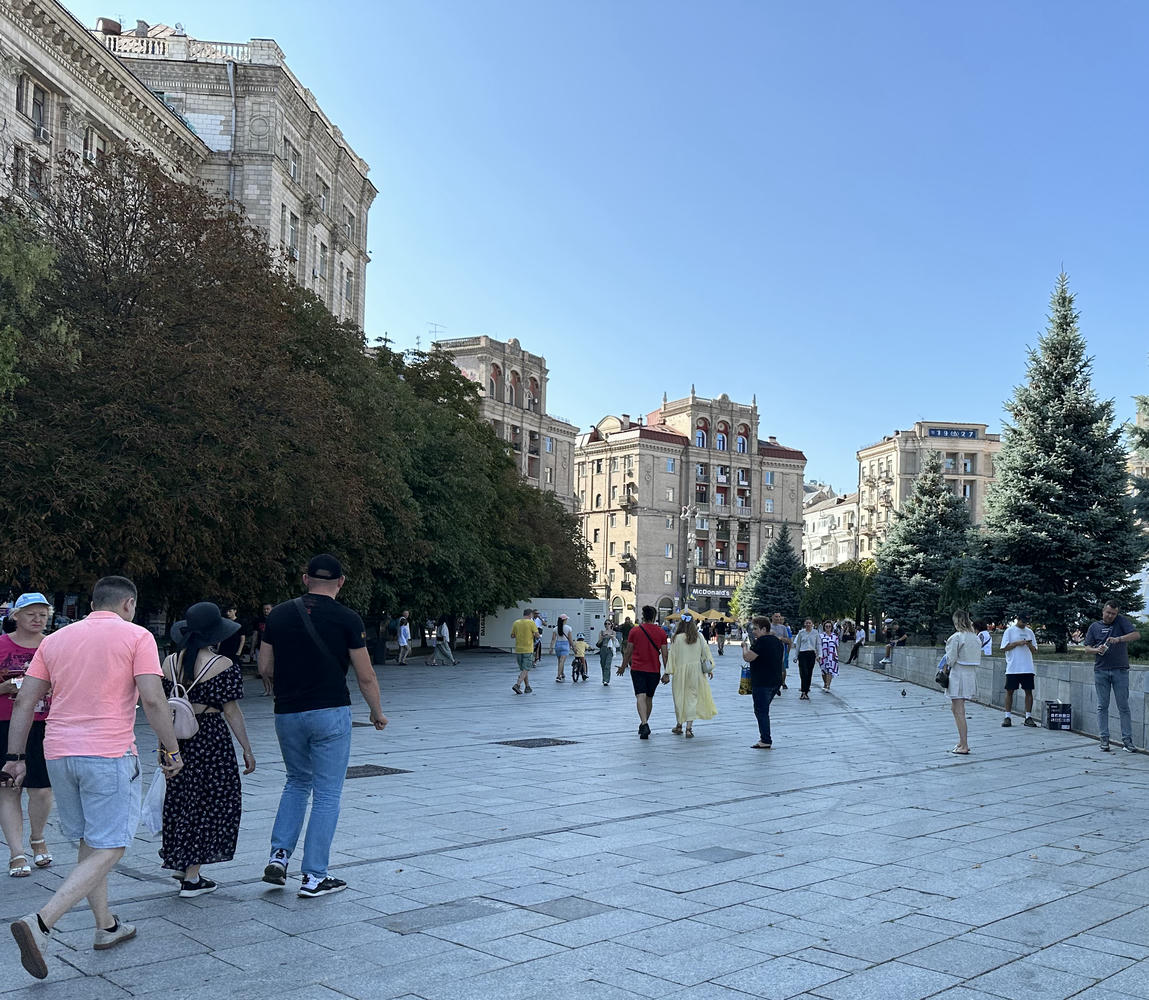
Those of you fortunate enough to have never been in a conflict zone might find this hard to believe. I bet, however, that Israelis understand what I’m talking about, as will anyone who’s been in the rear echelons of a war zone.
I had intended to include some more photos of normal life, but they were just so normal and boring that I changed my mind. If you’ve lived in any European capital you would immediately recognize life here. It’s, for the most part, normal.
But not entirely, which brings us to this post…
Air Raid Alarms
Though Kyiv is far from the front, it’s well within range of a variety of Russian weapons, including Iskander ballistic missiles, various cruise missile varieties, the “Kindzhal” hypersonic ballistic missile, and Shahed drones from Iran (which Russia pretends are their own weapons system called “Геран-2”, literally “Geranium 2” LOL). Recently, Putin made some deal with Kim Jong Un for the use of North Korean ballistic missiles. As a resident of a city that these missiles are launched at, let me first say “fuck you KJU!”, but also, thanks for being such an incompetent shit-tier despot that your incompetent weapons industry can field such unreliable ballistic missiles. It’s likely that some of these NoKo missiles has hit its target (see above “fuck you KJU!”), but the Ukrainian government isn’t shy about disclosing the times when they fail or just blow up mid flight. Institutional incompetence FTW for once!
Anyway, the reality of life here is that there are air raid alarms at all hours of the day or night, sometimes multiple per day.
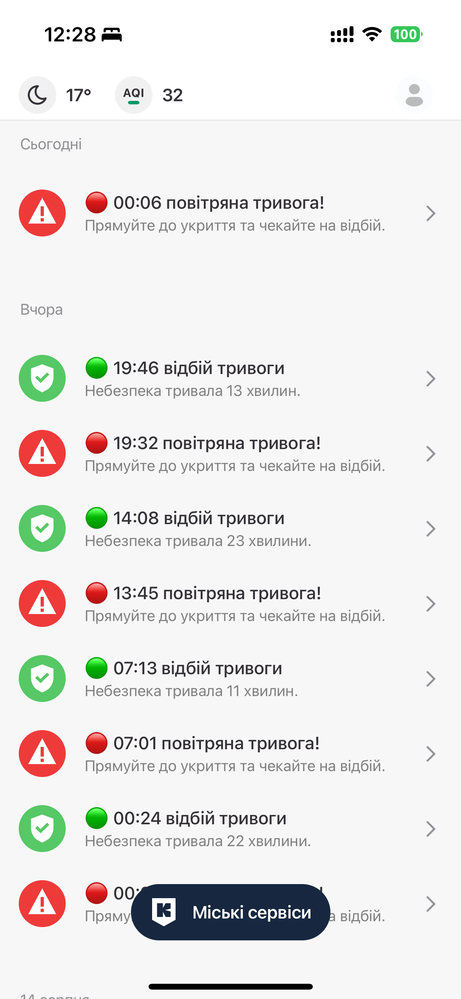
There are mobile apps that alert you when there’s an air raid alarm in the area, although unless you’re inside somewhere the sirens are very audible. They sound just like the air raid sirens in every nuclear apocalypse movie you’ve ever seen. They only sound for a few minutes though, presumably to preserve the sanity of the survivors.
Most Kyivans by now just ignore these alarms. That might be hard for you to imagine, but IMHO this is actually a healthy adaptation. The alarms come at all hours, but especially late and night and early in the morning. If every time there was an air raid alarm you woke up, grabbed your essentials (you do have an air raid bag packed in advance, right?), and ran to the shelter (which is in most cases either a musty basement or a metro station; in my case the latter), and sat on the floor in either hot stuffy or cold temperatures for an hour or two or three, you would have gone mad by now!
If you still find that hard to imagine, you should realize that “air raid alarm” doesn’t mean “a missile is inbound directly to my location”. It could mean that a jet capable of launching a Kindzhal took off from an airbase in Crimea, so the whole country is under an alert. Or it could mean that Shaheds were spotted outside the city. One time I heard an air raid alarm go off, and less than 30 seconds later one of the fancy new Zircon hypersonic ballistic missiles destroyed a building a few miles away, with an explosion so loud that I would have sworn it was next door to me.
According to the Digital Kyiv app, there have been 1222 air raid alarms in Kyiv during last 2+ years of war. Out of those 1222, very few impacted the capital; even fewer in the center where I live and where there is stronger air defense than probably anywhere else in Europe. And as I mentioned, life goes on; people need to work, their kids go to school, etc. You can’t blame the Ukrainians for ignoring these most of the time. However, those “very few” impacts do weigh on my mind…
The psychology of being under an air raid alert is very odd for me as an expat foreigner. I have not been able to fully adopt the “IDGAF” nonchalance of my Ukrainian colleagues. Every time I hear an air raid alarm, I immediately look at the Telegram channels where various people post about why an alarm has sounded. I try to gauge the level of risk, whether I should at least go sit in the more secure part of my apartment away from windows (I almost never do that since it’s so inconvenient to pick up and move my workspace), or just close the windows and remember that none of us get out of this life alive.
My personal rule is that if there are audible explosions, it’s time to make haste to the shelter. This is hardly a 100% risk-free plan (recall that Zircon I mentioned that hit with < 30 seconds notice, and no sound before it impacted its target), but it’s pragmatic. If I required a situation in which there is 0% chance of being killed by Russian ordnance, I would not be here. In cases of a massive drone or missile strike, the first explosions are likely the sounds of air defense batteries opening up, and the assault could last for multiple hours; in that case I’ll be safe underground.
I’ve also developed a sensitivity to sound as a result of being here for a while. If I hear a car backfire or a delivery truck drop a load, or the trash truck dropping our trash bins late at night, I immediately alert and think it was an explosion. Similarly, any sound that sounds like an air raid alarm gets my attention. Sometimes as I’m laying in bed trying to go to sleep, I’ll swear I hear an alarm, and have to check the Kyiv Digital app and satisfy myself that there is not any threat and it’s all in my head.
Part of my coping strategy for this stress is preparing for possible adverse outcomes, which gives me a feeling of having some control over the situation.
I, like most Kyivans, have a bag packed in case I need to run to the shelter. I would call this a “bug-out bag”; they call it “alarm suitcase” (тривожний чемодан). Maybe I’ll do a post some day about what’s in my bug-out bag. For now, suffice it to say it only bears a passing resemblance to what an American prepper would pack, because it’s for a very specialized bug-out scenario.
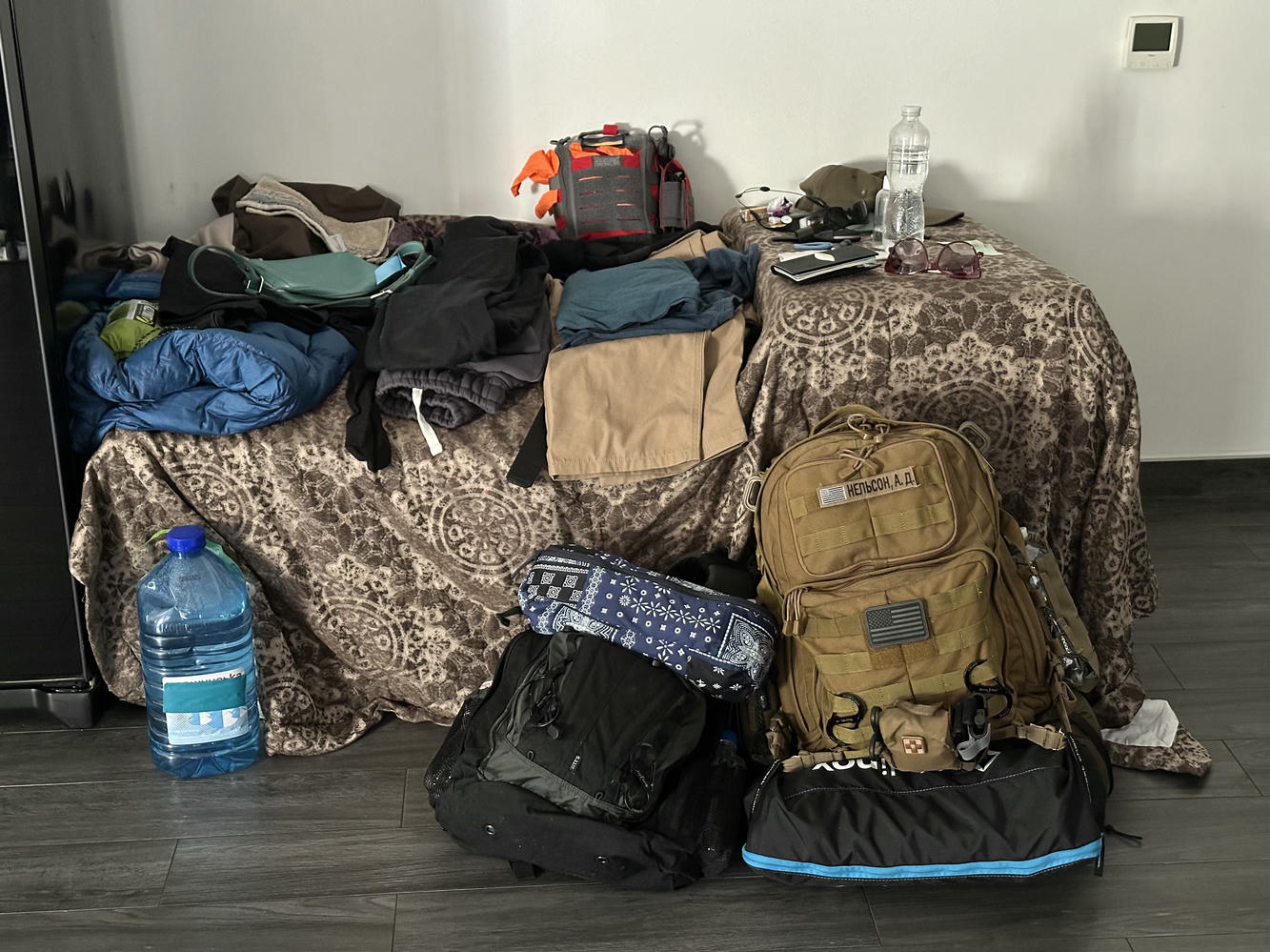
Ukrainian Losses
Of course, the human cost of the war is incalculable.
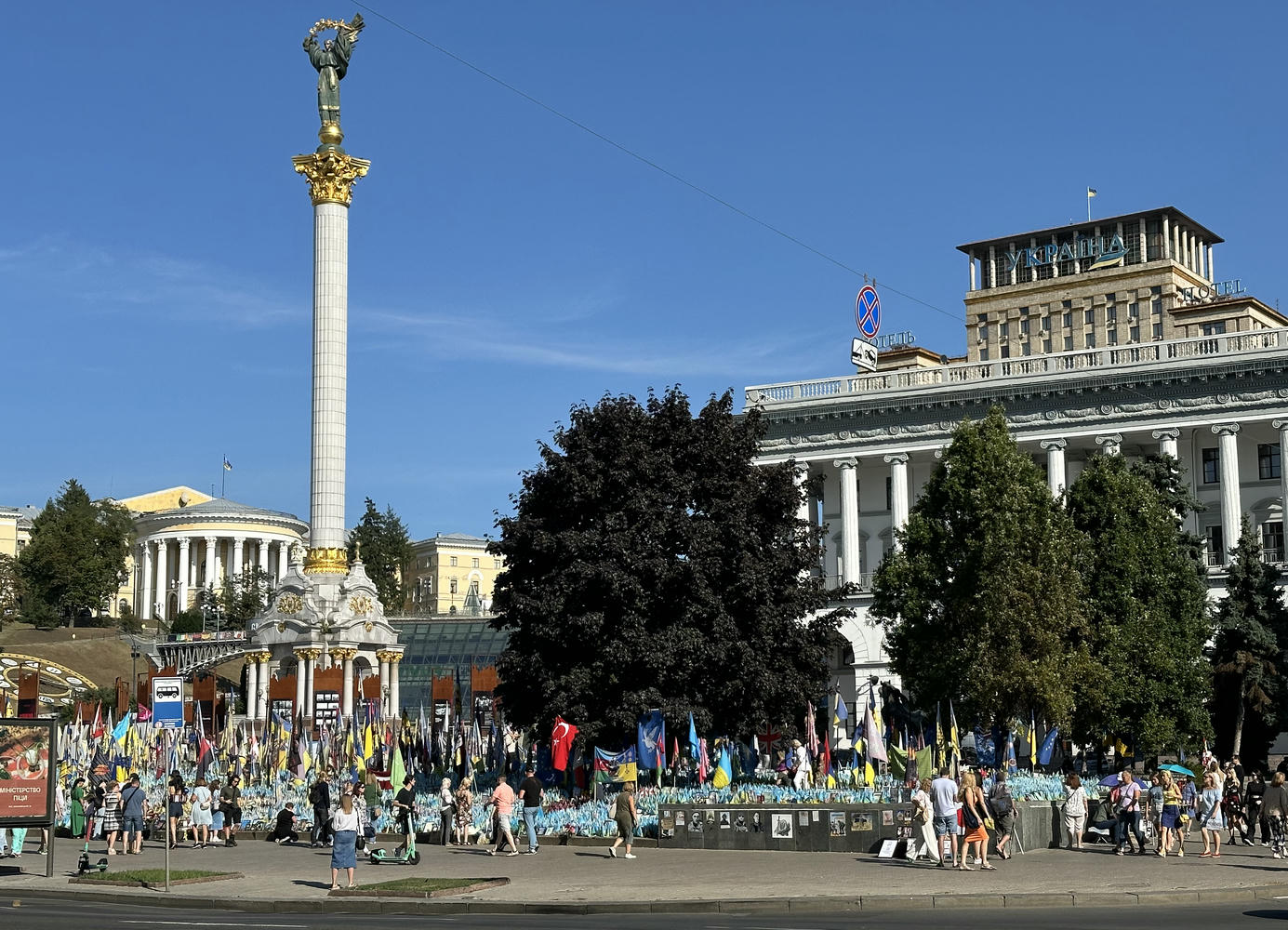
I don’t know anyone who hasn’t lost someone in the war. One of my acquaintances has been killed already, and several more are serving in the AFU now. This level of loss leaves a mark on the people who suffer it, which will be felt for generations. As the war rages on, the government deliberately avoids talk of losses, and crows about victories while usually staying mum on what they cost. That is probably the right strategy, but still there must be some immediate acknowledgement of the suffering and loss. Once such acknowledgement is on Independence Square. I don’t think there is literally one small flag for every Ukrainian KIA, but even so it’s a striking visualization of the scale of the loss.
Russian losses are said to be from 3x to an order of magnitude higher. I have no sympathy for Russian casualties, however. I doubt many Ukrainians do either. The Nazi invasion of the Soviet Union was over 80 years ago, and you’d still be hard-pressed to find anyone in the former Soviet republics to voice any kind of sympathy for the German soldiers who perished on the Eastern front. I would be surprised if Ukrainian hearts soften any sooner for the 21st century’s facist stormtrooper, the Russian invader.
Speaking of Ukrainian attitudes towards the Nazis vis a vis Russians, there’s an effort underway to purge Soviet and Russian culture from Ukrainian civic life, about which more later.
Visible Reminders of War
Even in the center of the capital, which Russia never occupied, there are many reminders of the destruction they have wrought, and the armed struggle of the Ukrainians to remain free.
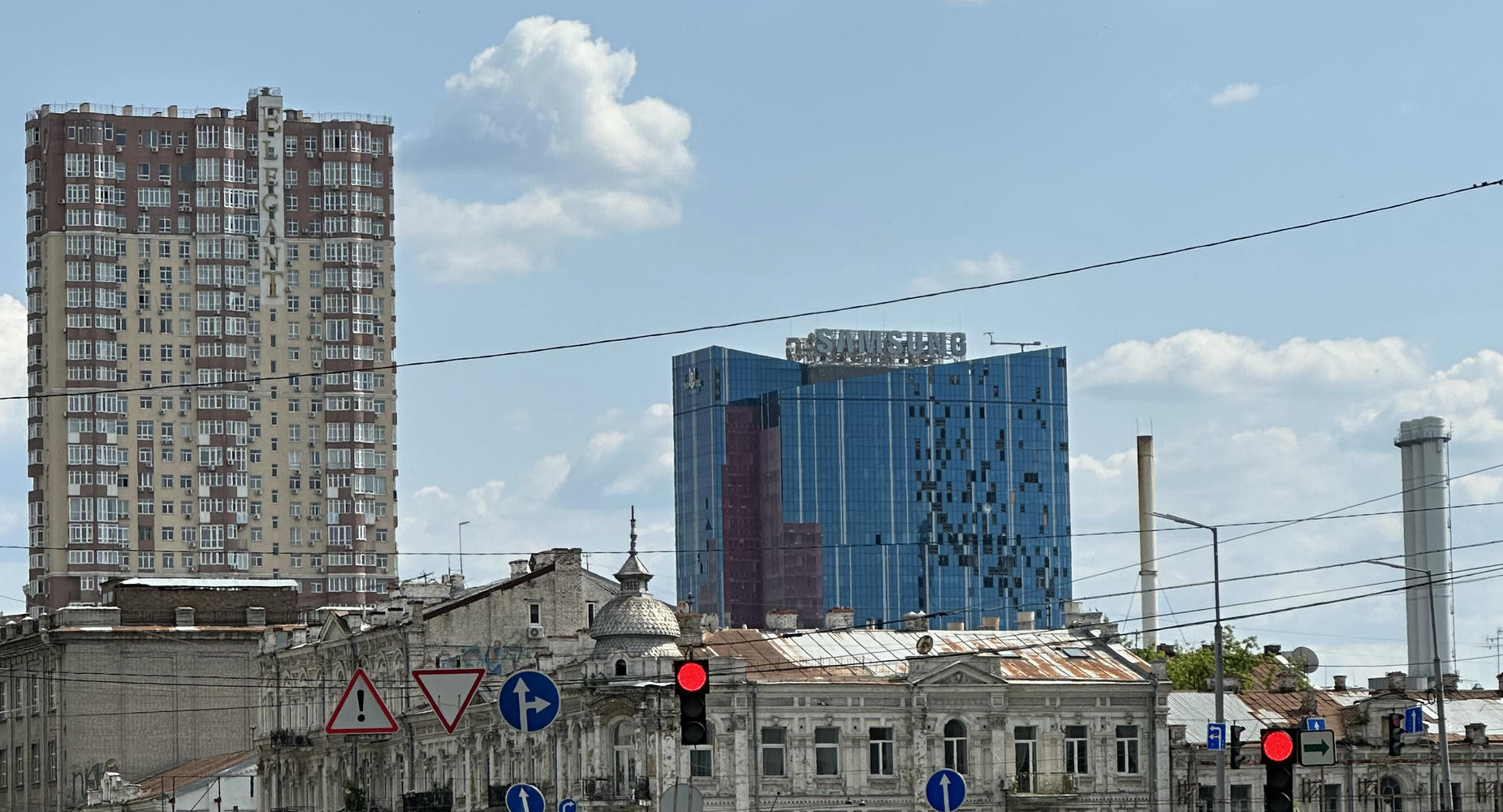
Though the Ukrainians try to rebuild destroyed buildings, that doesn’t always happen, nor is it a quick process. The Samsung building is boarded up and closed. I’m not sure what the plan is for it. Perhaps it doesn’t make sense to repair it when the risk of another strike remains. For now it’s a striking reminder of the war.
Equally striking is what you can’t see: Ukrainian monuments are packed in sandbags and barriers to protect them from shrapnel in the event of an attack.
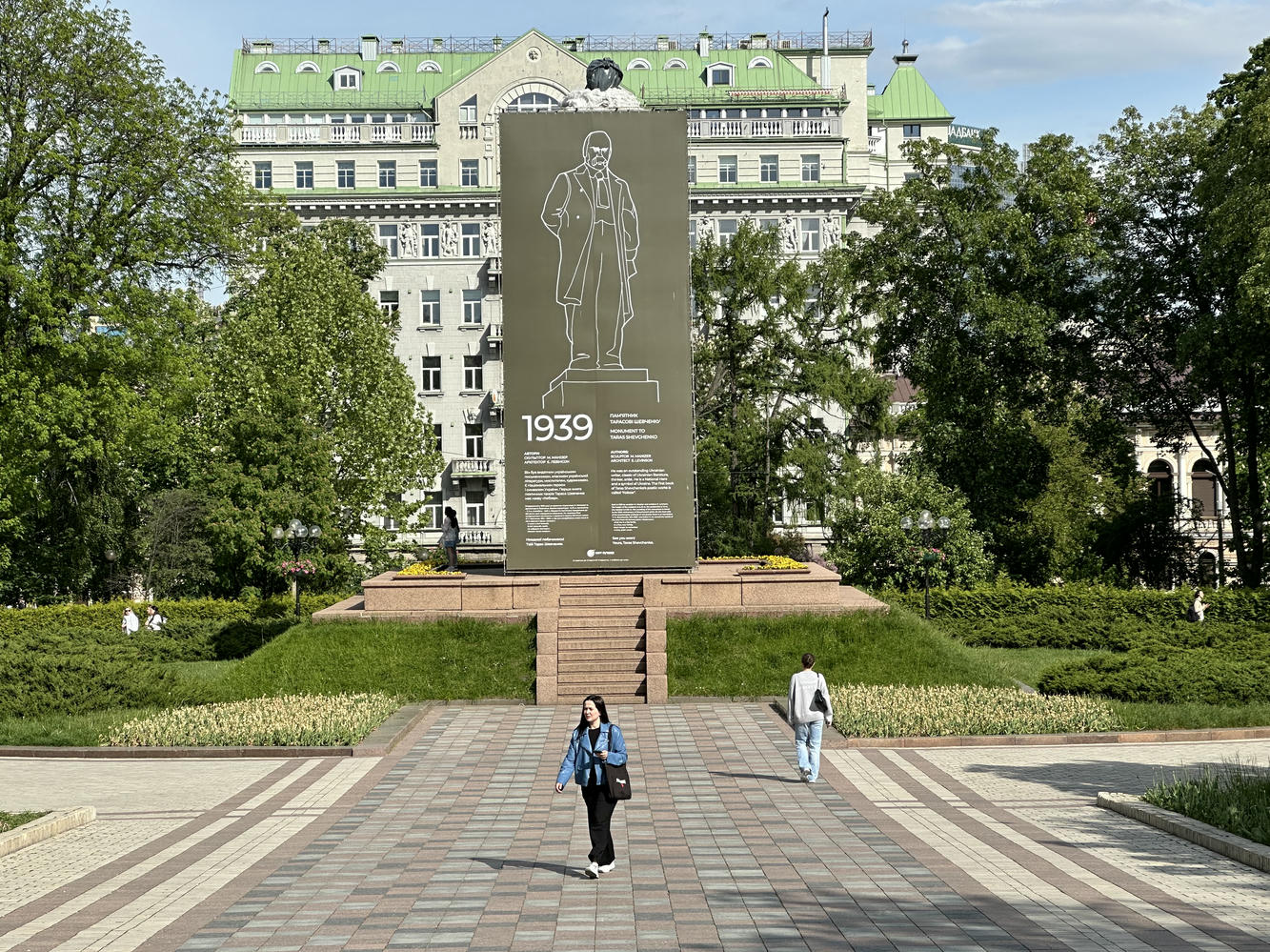
You’ll have to trust me that this is actually a larger-than-life statue of Taras Shevchenko, a famous Ukrainian poet, in the park named after him in the center of the capital. Pretty much any statue of any cultural significance is wrapped up this way. To my knowledge, Kyiv hasn’t lost any statues to Russian attacks as yet, and they are clearly intent on keeping it that way.
Throughout the city one frequently sees fortifications, usually unmanned and dismantled but sometimes very much manned.
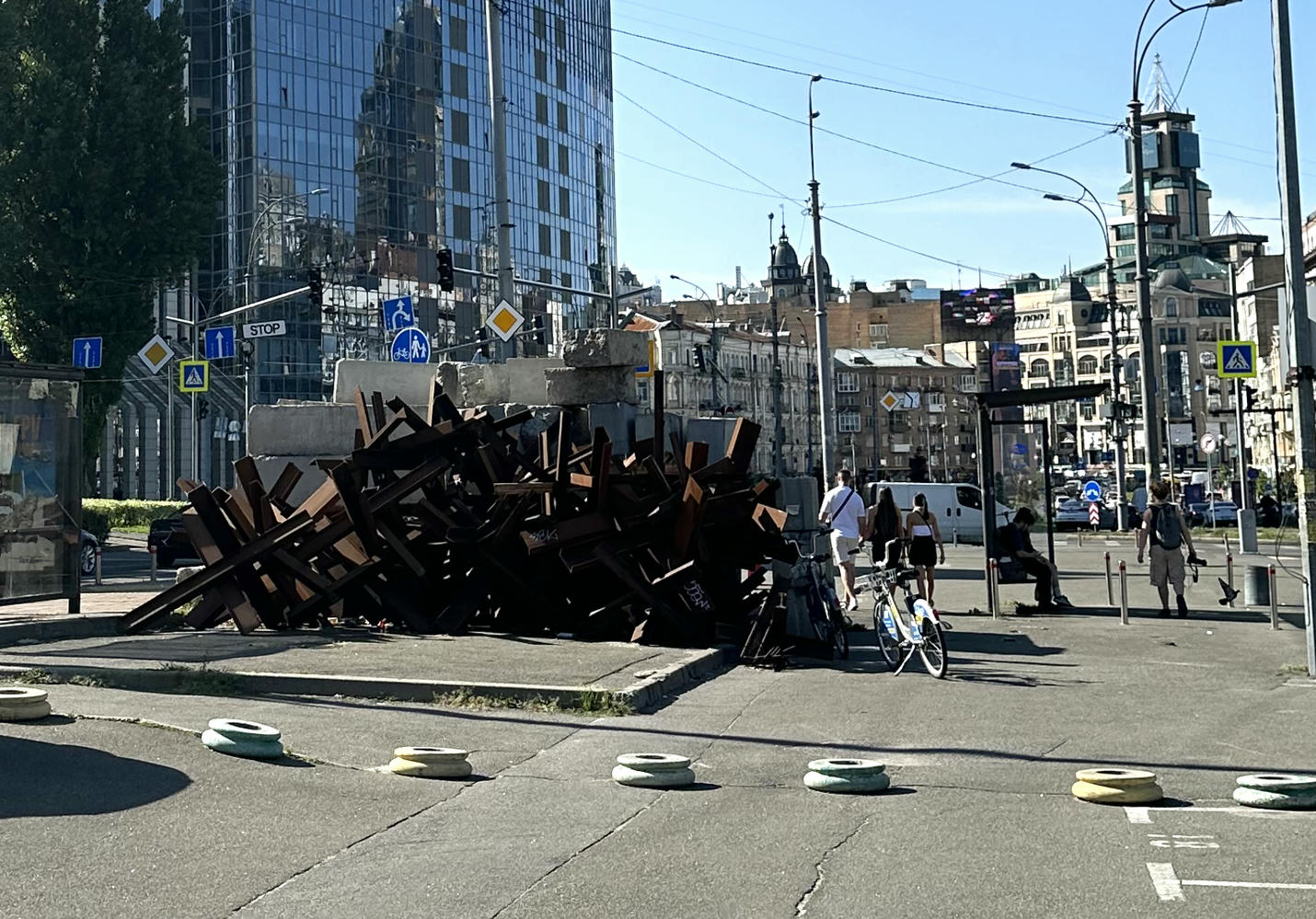
At the start of the war, there were checkpoints all over (called “blockposts” in Ukrainian for some reason), and key roads were blocked by tank traps and barriers, like I remember from my days in Baghdad. I have only gone through one checkpoint in my time here, in the Pechersk district very close to the Ukrainian parliament building. They are however still in operation throughout Ukraine, enforcing Ukraine’s mandatory registration for military service for Ukrainian men as much as guarding against Russian inflitrators.
De-russification
The historical reality is that modern-day Ukraine and modern-day Russia were, up until very recently, very close in terms of politics, culture, and geopolitical outlook. While the Ukrainians have a distinct Ukrainian language (to any Russian bot who claims it’s just a dialect of Russian, it sure doesn’t feel like I’m learning a dialect when I struggle to get out a few words of Ukrainian), Russian is widely spoken and a lot of Russian cultural touchstones are instantly recognizable to Ukrainians. Arguably, Russians were invented here in Ukraine in the Kievan Rus a millenia ago.
Ukraine was, it must also be said, the enemy of NATO and especially the United States while it was a part of the Soviet Union. An American executive with whom I was slightly acquainted years ago served in the US Air Force as a bomber pilot during the Cold War. When it came up that I was in Ukraine, he joked that he knew Kyiv very well–from the air. He was familiar with the strategic targets that he would be bombing if WW3 kicked off.
I mention this because my early years visiting Kyiv (I first came here in 2009) came at a time when Ukraine was ruled by Russian-backed politicians, where Russian language media was widespread, the Russian language was almost always spoken in the capital, and travel for work and pleasure between Ukraine and Russia barely registered as an international trip. Americans were regarded with the same skepticism that my parents would have regarded Russians in the 80s.
Since 2014 but especially 2022 that’s all changed, utterly. De-russification is in full force. If you were very familiar with the old Kyiv of brotherhood with Russia, it is a striking change (but, it must be said, completely understandable and richly deserved).
Here’s but one example:
At the Motherland Memorial (Батківшина-Мати), in 2010 I took this picture of two Russian tanks:
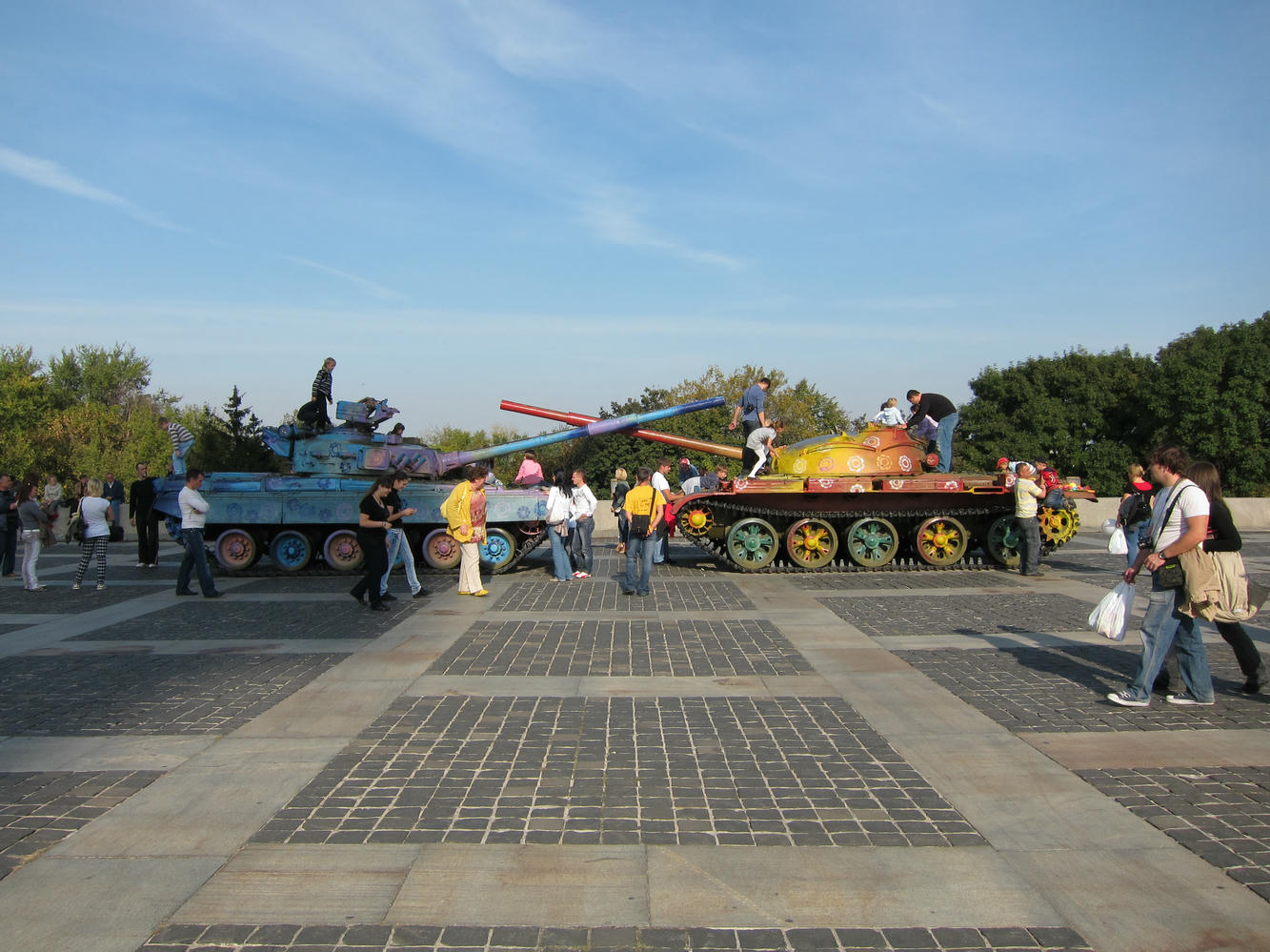
At the time I was struck by how they have painted the tanks in whimsical colors, as if to make fun of the horrors that were visited upon the Soviet Union in WW2. I even commented on this at the time to my Ukrainian colleague. There was a feeling that this was all very firmly in the past, not to be forgotten sure, but also not important to think about often.
Contrast that with this same location, a month ago:
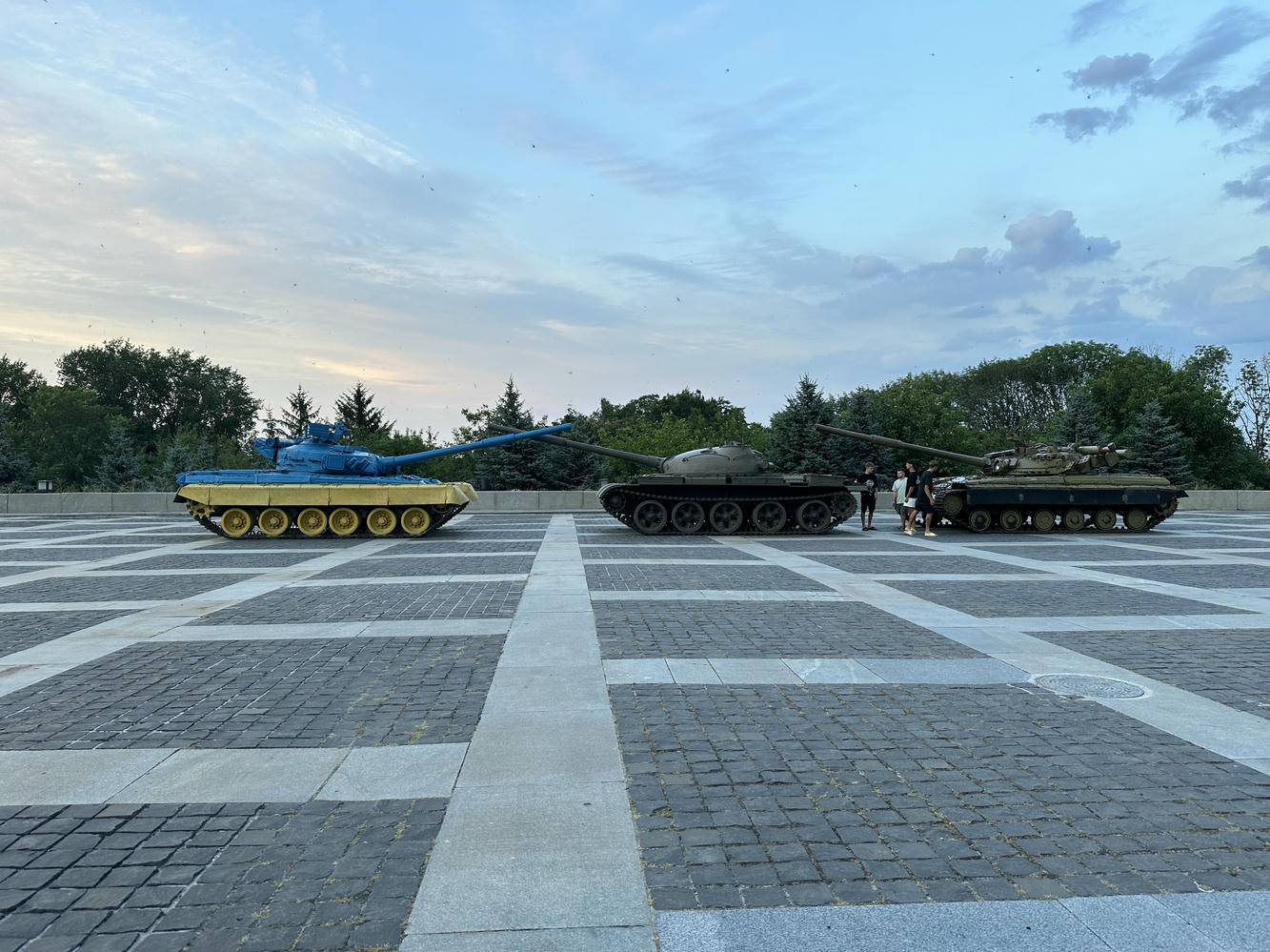
A very different vibe, if you ask me. This is no longer a distant cultural memory of a threat long past and barely even conceivable to the modern mind. This is the re-awakening of the old enemy, a fight that was thought won which must now be fought once again. An unforgivable sin that has been committed, and that will be avenged.
That’s not all that’s changed at the Motherland monument.
It used to list the names (written in Russian) of the major cities of the Soviet Union where WW2 was fought. Kyiv was on the list, as was Moscow, Minsk, and several others.
They’re still there, but the text is obscured by camouflage netting:
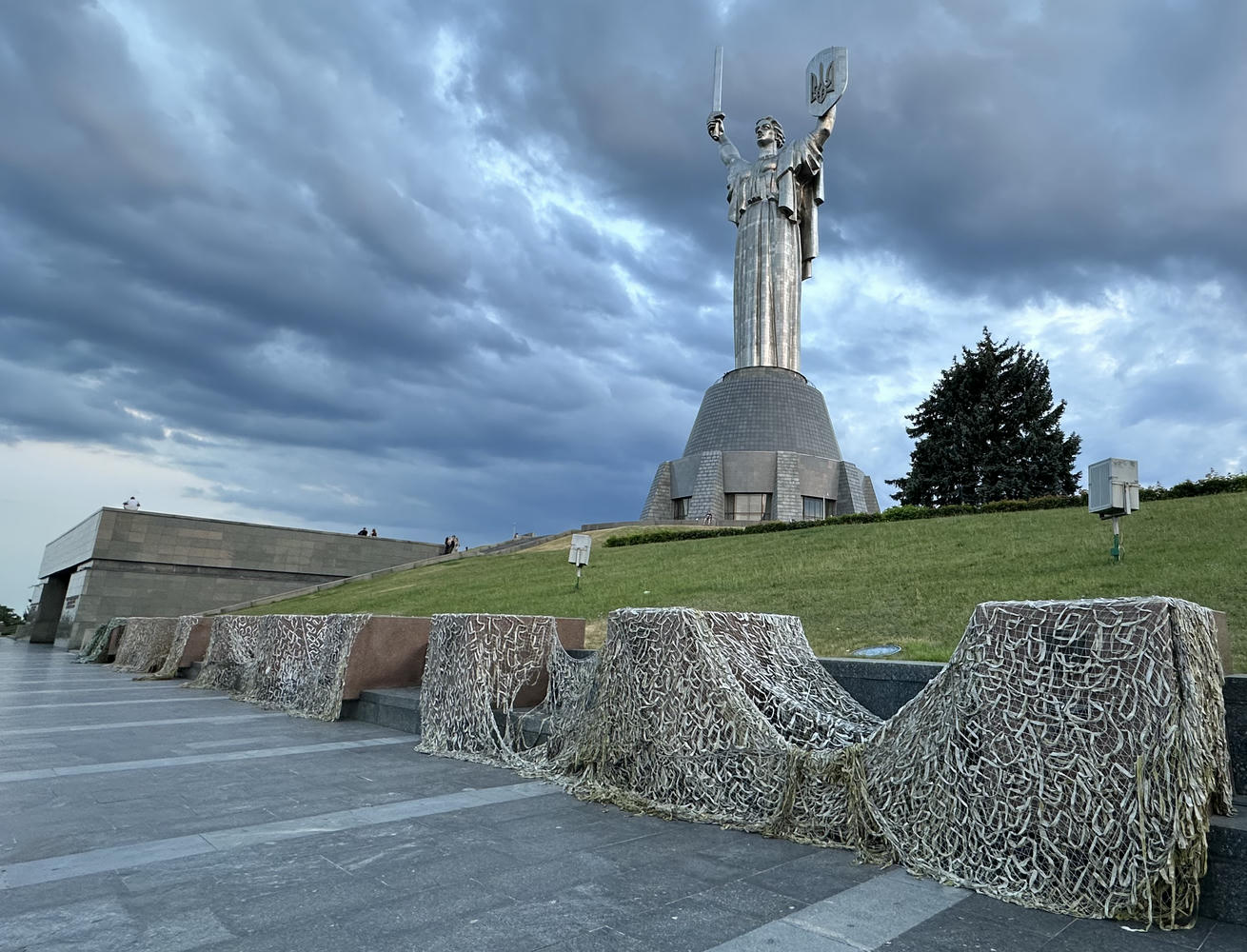
One more major change. See if you can spot the difference between the photo above and this one:
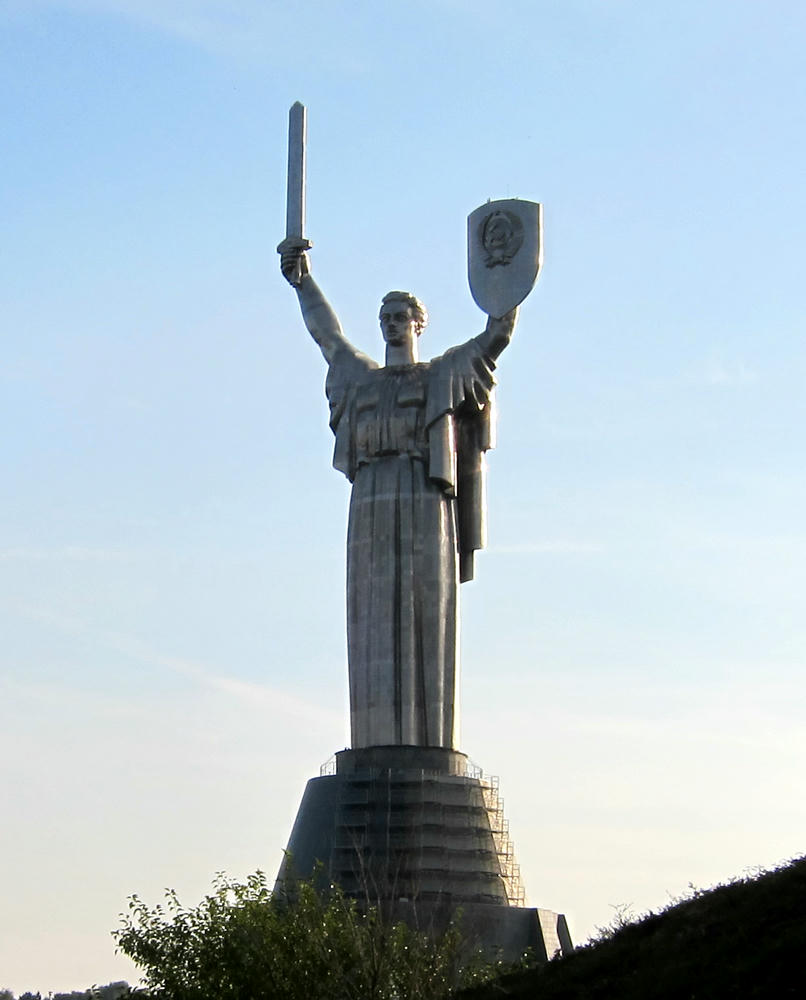
The Ukrainian government finally replaced that very Soviet symbol on the shield w/ the symbol of Ukrainian statehood, the trident. This pissed off a lot of Russians, who without any sense of irony thought it was outrageous to vandalize a cherished monument to the Great Patriotic War.
AFU Recruitment
When I first came to Ukraine in 2009, there was no emphasis whatsoever on military service. They had inherited the Soviet system of conscription, but I saw no signs of any effort on the part of AFU to recruit soldiers to the ranks. Serving in the Army was not a particularly prestigious profession, and those that could sought to avoid it.
Contrast that to now. Due to the general mobilization, technically all fighting age men 25 and up can be called up, with the exception of those who are medically unfit, the father of 3 or more children, and a few other edge cases. It’s now possible, with some complications AFAIK, to volunteer to join not just the Army, but a specific unit and a specific job. Some men calculate that it’s better to choose your unit and MOS than to get drafted and end up in some frontline assault group with all of the risks that entails.
A consequence of this policy change is that individual units can recruit specifically for themselves. They advertise all over.
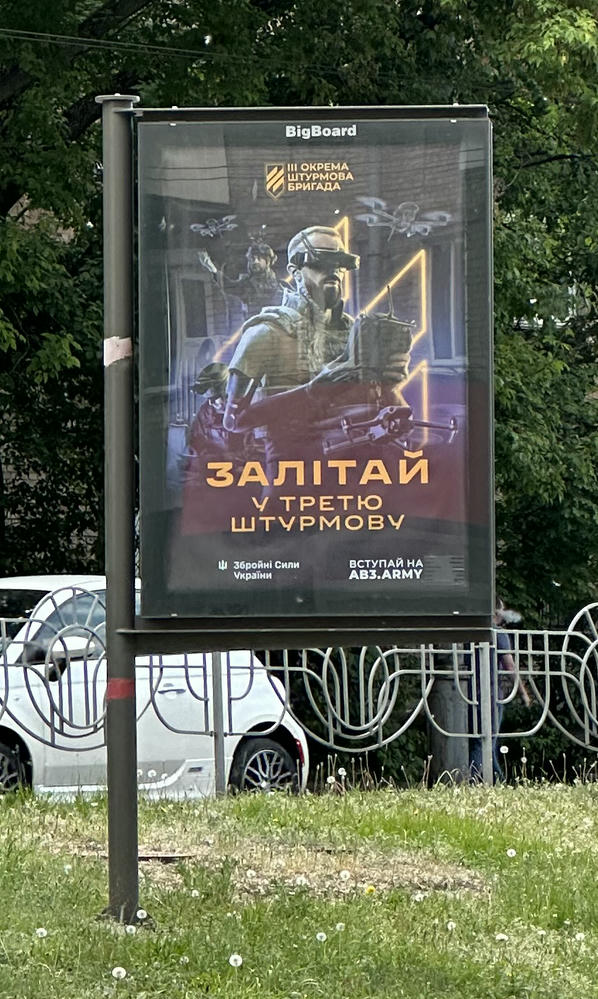
This one is from a very well-known brigade, the third separate assault brigade (3ОШБ), which has fought in some of the hottest spots of the war. As the name implies, they are a trigger-pulling front-line unit. Like any armed formation in this conflict, they are on the cutting edge of drone warfare, by necessity, and they need drone operators.
There’s also a darker side to recruitment, for which I don’t have any photos: there are units of the military whose job it is to draft men into the army, and sometimes those men don’t want to go. This leads to various potential confrontations, and there are many stories of corruption and abuse by these units. Not having anything to fear from these units is part of the way the expat experience differs from that of the typical Ukrainian man. That, and the fact that I can come and go across the border as I please.
Critical Infrastructure
Part of Russia’s strategy has been and continues to be the destruction of Ukrainian civil infrastructure, with a particular emphasis on electrical infrastructure. I read a report in the Kyiv Post which claimed that Ukraine may have lost 80% of its power generation capacity due to a combination of Russian attacks and Russian occupation. Whatever the number, the Ukrainian electrical grid is under significant strain. As a result, rolling blackouts are common.
In my specific location in the center of the city, power is pretty reliable. The worst I’ve experienced since returning was July 2024, during a heat wave, when I had 2 hours of electricity in every 8. In that case, the Digital Kyiv app shows the schedule for my address for the day, and it’s usually pretty accurate. Being able to know when the outages will happen, and having them spread out with brief periods of restored power in between, goes a long way to making them bearable.
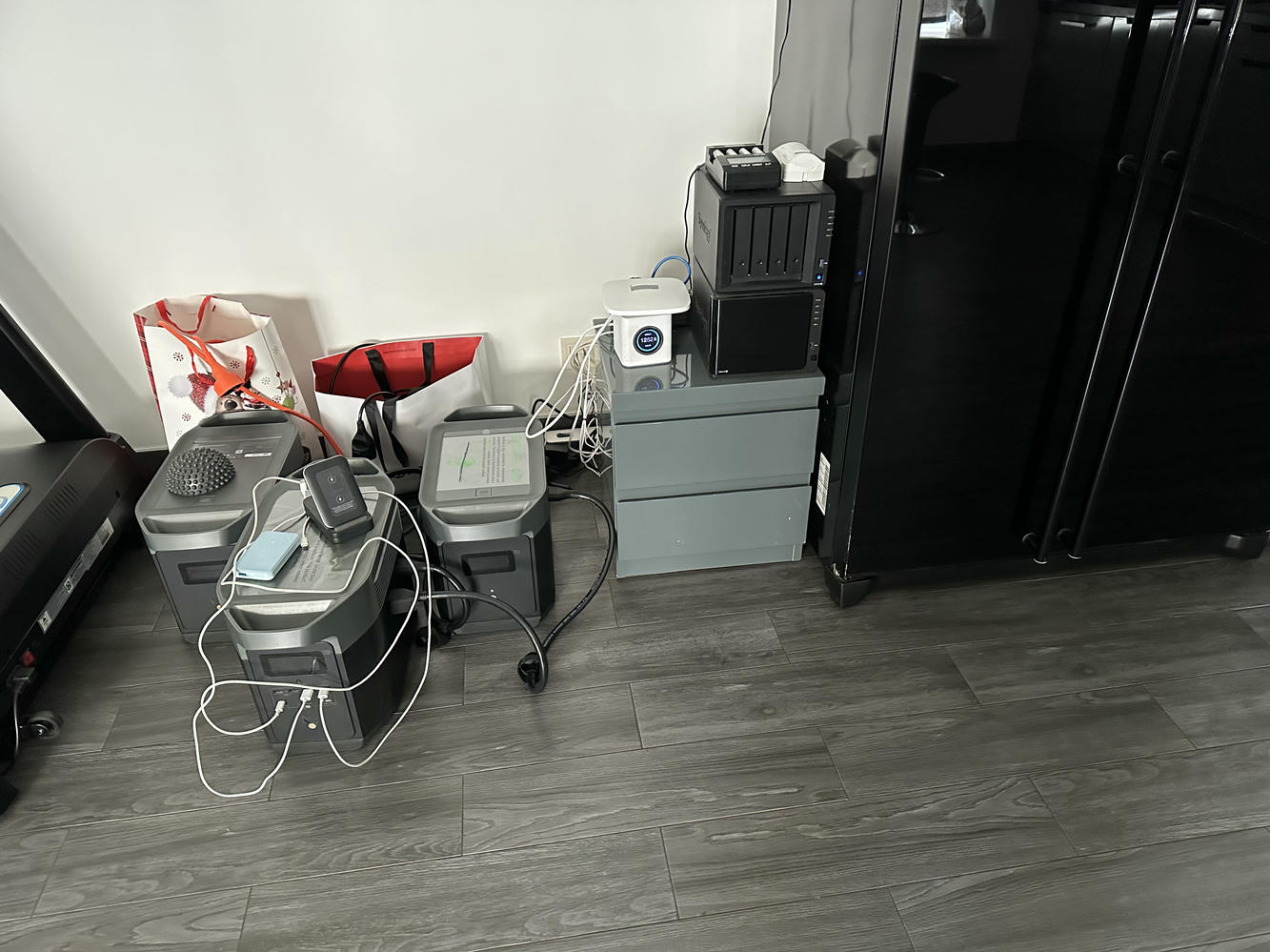
What also makes them bearable is that it doesn’t actually impact my day that much. I have an Ecoflow Delta Max power station, and I recently obtained two additional external batteries for it. With this system, my Internet connection, a Synology server, and my refrigerator are all powered off of the Ecoflow. During the heat wave, I also ran a mini split A/C unit in my room for brief periods of time to cool off when the heat became uncomfortable.
The Ecoflow and batteries can recharge within a two hour window. With the rolling blackouts we had, I needed backup power for about 6 hours, followed by two hours of power which recharged the Ecoflow batteries. If I had a 24 hour outage, I’d be in trouble. But the regular, scheduled, rolling blackouts we’ve had so far aren’t a problem; I quickly got used to it and they cause me little more than a slight annoyance.
Asute readers might ask “but what about your ISP”? ISPs have adapted to the conditions, and many of them offer fiber installations with extensive backup battery power at each building. If you are fortunate enough to have such a provider (as far as I know the waiting list now is months long), you will still have Internet access as long as you can power your own router/wifi access point. I and several of my colleagues work uninterrupted through blackouts, which is the only way I’m able to continue to live here.
Running generators in an apartment is not legal, nor is it safe. I’m sure it happens, particularly outside the center, but I’ve never felt the desire to do so. For businesses, especially retail businesses, it’s another story. Here in the center, most of them have generators by now, which are placed on the street with a cable run inside. Some are the little gas generators that you can buy at Home Depot in the US, but more and more I see proper industrial generators with longer duty cycles and greater reliability, and a wiring job that might have some chance of passing a US code inspection. You can tell when the power is out in an area by the sound; if there’s a deafening roar of generators, you can be sure that the power is out.
This does mean that walking around the city when there’s no power isn’t very pleasant, due to the noise and also the air pollution. I don’t like it either, but the Ukrainians are just adapting to the hardships imposed upon them by Russia.
Curfew
In most of Ukraine there is a curfew every night, from 12AM to 5AM. Only authorized vehicles and personnel are allowed outside during curfew. Anyone caught out without authorization is subject to detention. This has a massive impact on the logistics of urban life.
Bars and clubs get started much earlier, because around 11PM they have to close. Restaurants also can’t be open very late, and if you are hungry for delivery you’d better get your order in by 9PM or so or you might not get it at all. When visiting a friend’s place, as the evening gets late you have to either cut things short and go home, or you’re going to be spending the night. And there’s a mad rush for taxis starting around 11PM, so if you lost track of time and it’s 11:30 or 11:40 you’ll be lucky to get a taxi at all and it’ll be priced accordingly.
I don’t understand the military purpose of the curfew at this stage in the war. During the Battle of Kyiv in the early days it made sense, as enemy agents and saboteurs were actively operating in the city. Does it really meaningfully improve the security of the population now? I’m not sure.
Conclusion
This post ended up a lot longer than I intended. Maybe I’ll do a follow-up on air raid preps and procedures, I didn’t cover that as much as I wanted to.
I moved to Kyiv 6 years ago, to work on a new idea I had for a startup. I greatly enjoyed my time in Kyiv, right up until the full-scale invasion started in February 2022 and ruined it all. I returned to Kyiv in September 2023. I don’t know for how much longer I will remain here. But I will always have a fondness in my heart for the city of Kyiv and the Ukrainian people, and I hope someday soon this war will all be just a bad memory that old people go on and on about but the young find boring and irrelevant.